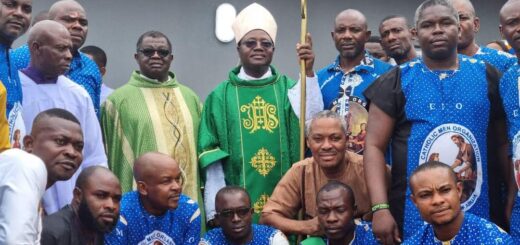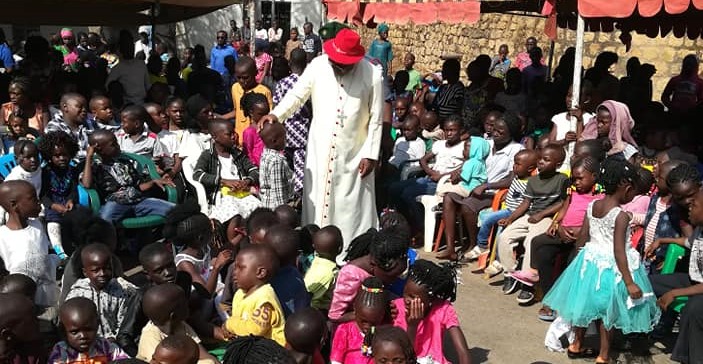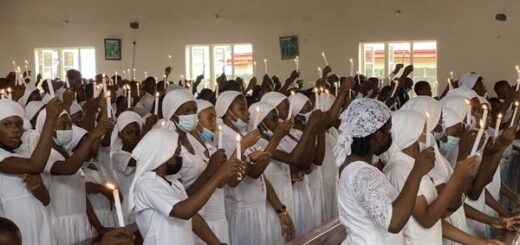Priests, Called to Build and Reconcile
by ARCH BISHOP · August 20, 2022
PRIESTLY ORDINATION OF TWELVE DEACONS, CATHOLIC ARCHDIOCESE OF ABUJA, HOLY CROSS PARISH, GWARINPA, ABUJA, HOMILY BY ARCHBISHOP IGNATIUS A. KAIGAMA, 20.08.2022
Readings: Jeremiah 1:4-9, Hebrews 5:1-10, John 20:19-23
Priests, Called to Build and to Reconcile
We are blessed today with twelve deacons who will receive Christ’s power (cf. Jn. 20:22), the great gift of the priesthood for serving and for sanctifying through the sacraments the people of God in the Church and by extension, our country Nigeria.
This priestly ordination does not merely mark an end to their nine years of philosophy and theology studies, but the beginning of an ongoing formation, so that as Pastores Dabo Vobis says, “they will be priests such as the people of God wishes to have and has ‘right’ to” (no. 79). Please let us pray that the exercise of the ministry of these new priests will, like that of Saint Paul, be characterized by personal holiness, selflessness, pastoral solicitude and breaking down the barriers that divide people. They should be ready to suffer, to put up with insults, hardships, persecutions, and to engage in dialogue by preaching peace and forgiveness even in the most difficult situations.
Jesus told His Apostles, “you did not choose me, but I chose you to go and bear fruits that will abide” (Jn. 15:16). My predecessor in Jos Archdiocese, the Servant of God, Archbishop Gabriel Gonsum Ganaka, used to stress that for a priest to bear fruits he must be a scholar, a saint and a gentleman. A scholar, not because the priest must have many degrees or write many books or be very captivatingly articulate, but that he knows where to find grace and knowledge in order to nourish his people; a gentleman, not by being sophisticated in appearance but decent in character; to be trusted to do things well even when no one is watching; and a saint, not because he must act as an angel, but he must be a praying priest, celebrating the sacraments well, faithful to his pastoral duties, conscious of God’s presence every moment of his life, and genuinely guiding people to God, not to himself or for ulterior motives other than the salvation of souls.
The call of the prophet Jeremiah (cf. Jer. 1) came at a time of worsening social and political situation of Judah and he was faced with the unenviable task of challenging their religious hypocrisy, economic fraudulence and oppressive practices; to speak out hard truths that others would rather ignore; to “pull down, and destroy, and scatter,” in order to “build and plant.”
For the priest today in Nigeria, his task like that of Prophet Jeremiah is to urgently pull down and destroy not the well-built physical structures, but the unhealthy habits rooted in our tribal, political and religious subconscious, which manifest as poisonous prejudices or violent actions. By the grace of God, this priestly action together with the sincere political will of our leaders will lead us to the national consciousness of being “one people and one nation.”
We religious leaders in Nigeria must be united in inspiring our people in whatever is true, honourable, just, pure, lovely and commendable (cf. Phil. 4:8). We must teach our fellow religious adherents how to accommodate others with respect and dignity and to use religion to promote integral human development and social harmony rather than hatred, division and violence; just as politicians should teach their fellow politicians to behave patriotically and create a social ambience that fosters unity, peace and progress. It should worry us terribly that because of bad politics and bad governance our young ones, discouraged and crippled by socio-economic conditions at home, are desperately seeking greener pastures in countries that our resources as the so-called “giant of Africa” could be ten times more than theirs. We have millions of idle youths, some on the streets and some at home due to government failure to let them back to school by positively responding to ASUU demands, and some, because their schools have become unsafe.
More than sixty years after independence and blessed with so much oil wealth, many rural and even urban dwellers are still experiencing the lack of potable water, good and safe roads, modern agricultural tools and today, everyone is feeling the harsh impact of the high cost of fuel, etc. Electricity supply is epileptic even as smaller countries around us enjoy it better. Instead of seeing politics as a means to good governance and better socio-economic conditions, leaders are employing politics for self preservation and when it suits them they resort to religious politics. Religion should enhance the worship of God; holiness of life, and prepare people for life in heaven. If only we use religion to build solid relationships with one another and with God, we will conduct politics without bitterness, malice or violence; we will have equitable distribution of resources and appointments made into influential positions with greater sensitivity and balance. This is how we can achieve the much needed national consciousness and cohesion, when merit dictates national policies or choices and not who you know or what tribe you come from or the religion you practise.
The temptation is to blame religion as the cause of Nigeria’s problems. But from empirical evidence, religious institutions have assisted the nation so much through educational, medical and social projects. The aim of true religion is to help people reduce spiritual, moral and social vices. We get it wrong when some of us lift private religious practices above national interests or the common good, letting religious distrust, suspicion and stereotypes dominate, and refusing to simply see fellow Nigerians as neighbours to be loved and cherished.
Even though the author of Hebrews stresses that unlike Jesus every high priest is beset with weakness (cf. Heb. 5.2), we still need holy priests today who will guide our country in the path of holiness and correct social order. Such priests must not be lazy or lovers of money and material things, abusers of children and adults or those who merely wear clerical dresses as a show-off. They must be dedicated to personal sanctification and the sanctification of those entrusted to their pastoral care. Even in the midst of current despair and sadness, priests must bring hope to the people and not to be dejected and discouraged as Pope Francis says, looking like people who have just come back from a funeral! (cf. Evangelii Gaudium 10).
My dear new priests, we welcome you as fellow workers, and with St. Paul, we beg you not to neglect the grace of God (cf. 2 Cor. 6:1-7), and do nothing that people might object to, so as not to bring discredit on our function as God’s servants. Do not be distracted by the very things you are renouncing for the sake of the kingdom of God. Jesus wants you and us to preserve the dignity of the office of the priesthood according to His will.
The life of a priest is a life of giving more than receiving. Jesus is therefore sending you not in search of personal purses, haversacks, sandals, the very things He forbade His disciples from looking for while on mission. Go therefore and be “priest enough” for the people. Be messengers of hope, animators of faith communities and spiritual guides to the people. May your voice echo the voice of Jesus – a voice of hope, a voice of truth, a voice of justice and righteousness.
We thank you the parents of these ordinands. We thank their formators in the different seminaries in Jos, Makurdi, Ibadan and Kaduna, their vocations directors, vocations team and all people of God for your encouragement and support to them. May God continue to bless your generosity to support more vocations.
Mary, Mother of priests, pray for these new priests and pray for us. Glory to Jesus!




